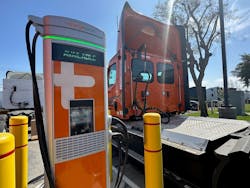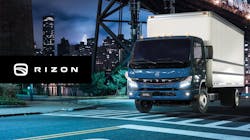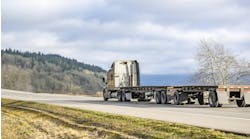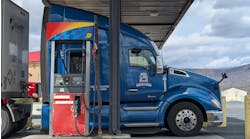FONTANA, California—Walking through the Velocity Truck Centers (VTC) here in Southern California, it was hard not to notice five battery-electric Class 8 Freightliner eCascadias plugged into the dealership's charging stations.
At first glance, the dealership looks like it might be on its way to becoming an electric vehicle charging depot of sorts. But the facility, which has $600 million worth of truck parts inventory on-hand, has been set up for more connectivity to help fleet customers throughout their transition to and ongoing use of EVs.
VTC, along with subsidiary Velocity-EV, is part of the larger Velocity Vehicle Group, one of Daimler Truck North America's (DTNA) largest dealer partners authorized to sell Freightliners, Western Star trucks, and the newly announced Rizon brand of battery-electric cabovers for urban delivery applications.
"We started this [EV charging] project in 2018, and it took about 18 months for us to get the charging infrastructure put in," noted Chris Johnson, corporate sales engineer at Velocity Truck Centers. "The No. 1 thing when it comes to infrastructure is engaging utilities as soon as possible."Velocity's Fontana, California, location currently houses two 62.5 kilowatt chargers from ChargePoint, but the demand for additional chargers is increasing. The Fontana site also has two EV maintenance bays, a charger mounted inside the facility, and technicians certified in high-voltage training to repair the electric trucks.
"The other thing that is very important with infrastructure that we sort of learned the hard way is future-proofing," Johnson told industry trade press during a site visit on behalf of DTNA the week of this year's Advanced Clean Transportation Expo. "Two years ago, we really needed two chargers, but now we need 10 chargers. So that's one thing that we try to instill in our customers' minds."
See also: DTNA CEO urges decarbonization in trucking to 'move at speed of right'
By the end of the year, Johnson indicated that Velocity plans to have 48 chargers installed across its Southern California locations.
"The trucking industry has been on a TCO [total cost of ownership] type algorithm," John O'Leary, DTNA's president and CEO, pointed out to industry media at the start of ACT Expo 2023. "Today, we have dealers that are involved in general parts and service, but we know that going forward there is going to be a lot more involved. There will still be parts and service, but there will also be a lot more connectivity and bundled solutions."
"We have stated that we are going to try to grow our service up to 50%," O'Leary added. "Our dealers are going to play a key role in doing that. Velocity is a great one to look at here in California and is kind of what the epicenter might look like in terms of decarbonization and service offerings. So they are definitely leading the charge for us in terms of what dealers are doing right now."
Velocity EV named exclusive Rizon distributor
Rizon, Daimler Truck's newest brand of commercial battery-electric trucks, recently unveiled three new models designed for urban delivery applications. During ACT Expo, the company announced that Rizon's Class 4 e16M and e16L and Class 5 e18L medium-duty models will be distributed exclusively by Velocity-EV.
See also: Daimler enters medium-duty EV race with Rizon brand
Rizon's model year 2024 trucks will be available for order starting in Q2 2023 at Velocity Truck Center locations throughout California, with additional markets to be added in 2024. Velocity also intends to begin appointing dealers for Rizon in areas outside its existing service territory to provide a broader nationwide network. Demonstration vehicles will be available to test drive at select Velocity Truck Center locations in Q3 2023, with customer deliveries beginning in late 2023.Rizon trucks can be charged by two types of battery charging systems: level 2 AC charging and DC fast charging (up to 104 kW). With AC charging (19.2 kW), recharging one of Rizon's medium-duty trucks would take about five to six hours, while using high-powered DC chargers would take about one to 1.5 hours. Fleets will also have the option to utilize the 40 units of 150 kW chargers installed at Velocity Truck Centers along California's high-transit corridor stops in Rancho Dominguez, Fontana, Industry, and San Diego.
Dealer, OEM plan for charging scalability
When it comes to widespread EV adoption in trucking, for OEMs like Daimler, building trucks is the easy part. The biggest obstacle remains whether the electric grid and charging infrastructure can accommodate EVs.
See also: Report pinpoints top challenges for widespread battery-electric vehicle adoption
From a macro view, Alexander Voets, general manager of Velocity-EV, said the grid should hold enough power to accommodate the EV transition as it happens. However, at times, he said there is an issue at the micro level when insufficient power is generated in a certain area.
"It is a case-by-case decision still; unfortunately, there is no one size fits all," Voets said. "Southern California Edison is a very good utility company, and they are technology forward, but not every utility company is as collaborative on these things."
"Generally, where there is a lot of commercial activity, there tends to be more power," Voets added. "Get with the utility company first, have a good plan in place, and plan for the next five to 10 years. It's always hard to predict the future, but I would say if you don't have a plan, have a plan to get to a plan. Plans can change, but utility companies need to work with something."
Rakesh Aneja, DTNA's VP and chief of eMobility, also emphasized the importance of keeping the anticipated demand for EVs and long lead times for utilities in mind. In that respect, DTNA has been utilizing connectivity and telematics data from 300,000 diesel trucks to analyze their operational patterns, domicile, and dwell times. Aneja said this is helping DTNA further anticipate the average time EV versions of these trucks would be running and where additional charging stations will be needed.
"We are starting to collect pools of data, so once those trucks go electric, we can see where the demand is going to come from," Aneja explained. "We've offered that data to utilities in terms of using that anticipated load to see what investments could be done ahead of time proactively."






